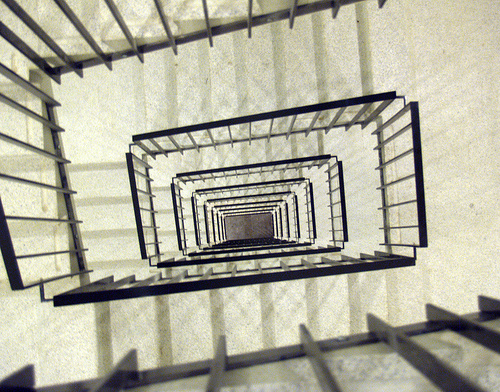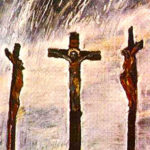We run our website the way we wished the whole internet worked: we provide high quality original content with no ads. We are funded solely by your direct support. Please consider supporting this project.

The Future is Not Like the Past For God (or Us)
Image by seier+seier via Flickr
Everyone agrees that we are not free to change the past. No sane person would claim, for example, that I can now make any free choices about whether John F. Kennedy will be assassinated or not on November 22, 1963. This deed, like all past deeds, has already been accomplished.
Now consider, if God has always foreknown what I will do in the future, then he certainly knew this on November 22, 1963. His knowledge of my future would thus have been among all the facts of reality that God knew on November 22, 1963.
Suppose for the sake of argument that God decided to reveal to us everything he knew to be true on November 22, 1963. Suppose that on this date God sent down a book from heaven containing all of this information entitled God’s Book of Known Facts. Now, if everything you will ever do in the future is listed in this book given on November 22, 1963, and if you are not free in relation to anything in the past, is it not obvious that you could not be free with regard to anything in your future as well? Your whole future is settled in the past—right there in God’s Book of Known Facts.
Suppose you read about your future in this book. Let us suppose that among many other things, you read that you will choose to cheat on your taxes on April 12, 2017. This was written on November 22, 1963. Wouldn’t you now feel the truth that you are no more free to decide your future than you are free to change the past—for you now see your future is past? How could you possibly believe that it was still up to you to resolve whether or not you would cheat on your taxes on April 12, 2017, when you know it is not up to you to resolve any settled fact about November 22, 1963?
Think of it this way. Freedom is the ability to choose between various possibilities. You are free to cheat on your taxes or not only because it is possible for you to cheat on your taxes or not. But if the fact that you will cheat is written in God’s Book of Known Facts, and God can’t possibly be wrong, then it is not possible for you not to cheat on your taxes. Hence you cannot be free to choose between the possibilities of cheating or not cheating. In other words, you can’t be free.
Someone might respond by claiming that God would not reveal such information precisely so that we will remain free. But this response is simply admitting that we only feel free because we are ignorant of the truth. If we are truly free, morally responsible agents, our freedom cannot simply be a feeling based on ignorance. If we are truly free, our ability to determine our future must be rooted in reality. It must really be the case that you could choose to cheat or not cheat on your taxes. And this means that what we will freely do cannot be among the facts recorded in God’s Book of Known Facts on November 22, 1963.
If we are truly free, God’s Book of Known Facts must be open to additions recorded with each free decision we make, just as God “added” fifteen years to Hezekiah’s life in response to his prayer (2 Kings 20:6). If we are truly free—if this is in fact part of the way reality really is—there can be nothing beyond possibilities to be recorded until we choose to act on one of those possibilities. We freely create the fact and then God records it.
If we possess authentic self-determining freedom, then our future must be fundamentally different from our past. The past is unalterable. There are no options for us, which is why we are not free in relation to it. There are not “ifs” or “maybes.” Everything about the past is definitely this way and definitely not any other way. If we are free, however, our future must be different from this. It must in part consist of realities that are possibly this way or possibly that way. Our future must be, at least in part, a realm of possibilities. And the God who knows all of reality just as it is and not otherwise must know it as such. He is not only the God of what will certainly be, he is also the God of possibility.
—adapted from God of the Possible, pages 120-123
Category: General
Tags: Free Will, Future, God of the Possible, Open Theism, Possibility, freedom
Topics: Providence, Predestination and Free Will
Related Reading

The (Spiritual) War on Terror
Jesus’ ministry was a ministry not of resignation but of revolt. He was about revolting against the cruel tyranny of a world ruler (Satan) that was oppressing God’s people. He was about seeking to give back to people, and to win back for his Father, what the enemy had stolen and destroyed. He was about…

Open2013 Reflections
Both participants and leaders share about what was happening at Open2013 and some of their thoughts on Open Theism. Listen in and hear from Greg Boyd, John Sanders, Tom Oord, T. C. Moore, Jessica Kelley and many more.

Why Did God Allow Evil?
Is it possible to force people to love? Powerful people may be able to force others to do just about anything. Through psychological or physical torture, they may succeed in forcing them to curse their own children to deny their faith. They may even succeed in forcing others to act and say loving things to…

What about the Gospel of John and Calvinism?
Question: The Gospel of John seems to teach that people believe because God draws them, rather than that God draws people because they believe. If this is true, how can you deny the Calvinistic teaching that salvation is based on God’s choice, not ours? Answer: As you note, many people find support for the view…

What is the significance of 1 Samuel 13:13–14?
Because of Saul’s rebellion, Samuel tells him, “The Lord would have established your kingdom over Israel forever but now your kingdom will not continue.” The biblical narrative depicting God’s dealings with Saul up to this point is predicated on the assumption that God intended to establish Saul’s descendants as the permanent heir to the throne…

Could the God of Open Theism Have Foreknown the Crucifixion was Going to Happen? (podcast)
Greg talks about a really really really smart and good God in a really really really bad world against a not-quite-as-smart adversary. Episode 540 http://traffic.libsyn.com/askgregboyd/Episode_0540.mp3
